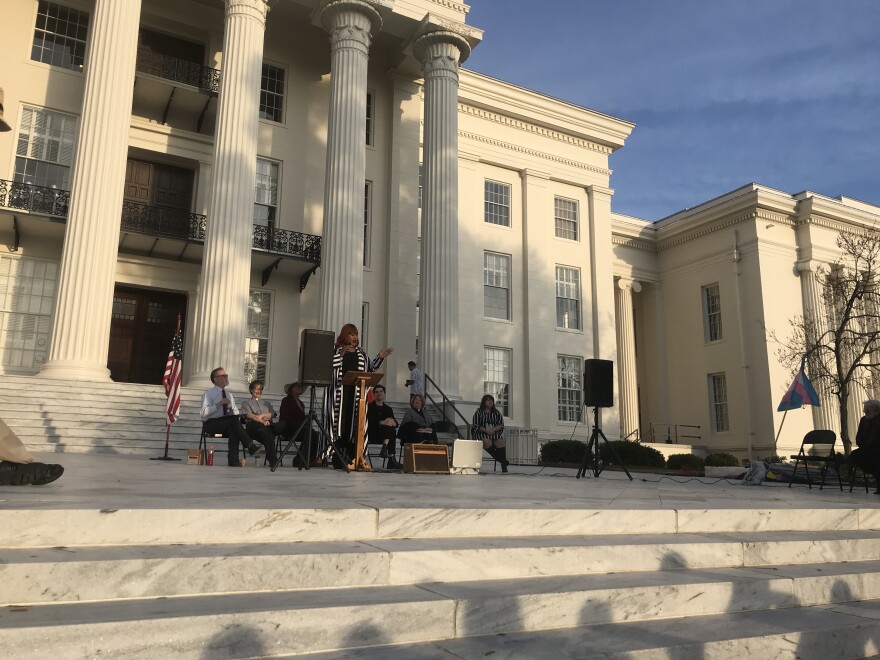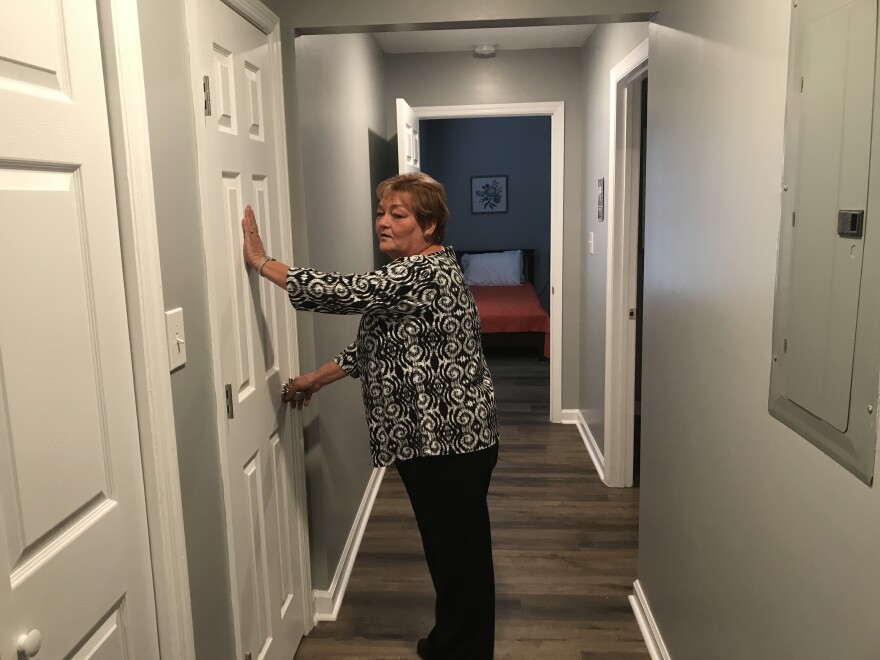Readers please note this story contains content of an adult nature that might not be suitable for all ages.
“Seeing Steve stand over him like he was beating him like he was…I can feel every thump that went across his body. Billy Jack Gaither was finally dead.”
About a half dozen students are gathered at Auburn University’s campus in Montgomery watching the documentary “Assault on Gay America.” It tells the story of how Billy Jack Gaither was beaten to death with an axe handle. The message is, in Alabama, violence against gay people is not a hate crime.
The crowd was bigger for this talk at the Alabama capitol. Auburn professor Dr. Paul Hard organized the 20th annual Vigil for Hate Crime and Violence.
“If you’re grateful for the nice weather in spite of everything they were telling us would you just say, yes!” Hard said.
“Yes!” the crowd responded.
On one side of Hard is the flag of Alabama, on the other is rainbow Gay Pride flag. But he wasn’t the only speaker.

“We couldn’t go any further today without taking a moment to recognize those who are here as our allies our supporters our fellow family members,” Hard said.
Daroenshia Duncan Boyd is a transgender woman of color. She’s the CEO of a group called Alabama’s TAKE, which stands for Transgender Advocates Knowledge and Empowering.
“I’m super excited to be here. Like I said I hate I had to come in honor of 20 years for this vigil, but this is the best place to be at because often time we know that trans women of color don’t have a voice in the race,” Boyd said.
The message of the night’s gathering is that violence against gay or transgender people needs to be considered a hate crime. But that’s not Boyd’s only concern.
We sat down with Boyd at TAKE headquarters in Birmingham, where the agenda is a little different. TAKE helps trans women of color including those who work in the sex trade, an industry Daroneshia knows about.
“Oh girl I was inside my house and the first person believe it or not it was first person was a lawyer,” Boyd said.
Boyd performed sex acts for money.
“He was a lawyer so it was a great experience and it wasn’t, it was something different for me because he wasn’t my ideal type of guy. But oh well I made it work and made over like $400 plus $500 or whatever so I wasn’t complaining about it that first time. But then again it got harder as they days progressed honey because everybody isn’t going give you $400 and $500 so just being real with yourself and knowing that sometimes you’re going to have to work with $40 or something,” Boyd said.
And her reason for turning to sex work is simple.
“I had to turn to it because inn wasn’t meeting. I had lost a job and I was working. I had unemployment and unemployment was only $180 or $190 something a week,” she said.
Boyd said she was never under the control of a pimp, but she said others in the LGBTQ community are.
“Not being able to find stable income, stable housing, so you have to do something in order to survive,” she said.

This is where Boyd begins to address the issue of gay and transgender trafficking. For many teenagers, it starts with running away from home, typically over arguments with their parents. Boyd said being gay on top of being a teenager can complicate things.
“A lot of youth are forced out of their homes. Especially here…conservative…evangelical Christian, and all that stuff in a red state. If you’re pushed out of the house from your family, you don’t have support or whatever…You’re going to have to find a way to survive,” she said.
The human trafficking support group Polaris said 40 percent of homeless youths in the U.S. identify as LGBTQ. Homelessness is considered a key factor for young people who end up being trafficked. Boyd’s job is try to turn these young people around, like she did.
“Because I had someone to tell me that there was hope when I spent 13.5 years using cocaine I knew that one day I would be delivered. When I was running the streets and I was stunting and I was stealing I knew that one day I would be delivered. And I wasn’t doing this because I wanted to do it for fun. I was doing it because I had to survive,” Boyd said.
For Boyd that meant survival sex. Trafficking involves a pimp and the FBI says if someone sells a minor for commercial sex, the law considers that young person to be a victim of trafficking.
In the Huntsville area a lot of these young people come here.

Safe Harbor Youth is a Transitional Living Program for youth, ages 16-22, who have run away from home are neglected homeless living on the streets or victims of human trafficking.
“Most of our kids identify as bisexual and that’s because they’ve been sold to this person or that person,” said Lynn Caffrey, who runs safe harbor youth.
She was also a victim of child sex trafficking where he was sold to both men and women.
“Saying it’s a push to be gay, that’s not true. Well in human trafficking, like me I was sold to both males and females so I had to make a choice when I got my life changed. Do I want to be gay do I want to be straight? You have to really learn who you really are. And a lot of times they don’t know who they really are when they are that young,” Caffrey said.
Caffrey said teens who identify as transgender might have it the toughest when it comes to acceptance, particularly at home. But, Caffrey has opinions of her own when it comes to LGBTQ young people living in a conservative state like Alabama.
“Religion, Bible belt, the South is so huge on it. But if you look at the book the Bible it says, ‘judge not and you shall not be judged,’” Caffrey said.
Caffrey carries that message to Alabama’s faithful, in the form of talks at local churches.
“Like when I speak in churches and stuff, if you come to my house and you see a kid dressed in drag when you come to my house, don’t judge them. That’s not what you are coming there for. If you can’t come there with an open mind and understand that they’re humans, they’re just like me and you. We are just like me and you but they have different sexualities. We are not here to judge them on their sexualities,” Caffrey said.
Back at TAKEN’s office in Birmingham Boyd talks about the constant struggle to keep at-risk clients who also happen to be gay or transgender from falling in the trap of being trafficked.
“When you are vulnerable, especially the ladies that experience substance abuse, they basically settle for this condition, not knowing that it’s really toxic,” Boyd said.
For Boyd, the story of one girl she knew comes to mind. She was 15 years old, pushed out of her home, and took up with a man in his 40s just to survive. Boyd said it doesn’t take much for a situation like that to go very badly.
“It’s a risky business, and it’s very dangerous, because you don’t if your next John will be…the person who will kill you,” Boyd said.
TAG OUT: If you or someone you know is being trafficked, Alabama Public Radio has a list of resources to help. Got to apr.org-slash-traffic for phone numbers and links to groups that support trafficking survivors. You can also text the word traffic to 855-353-6644.







